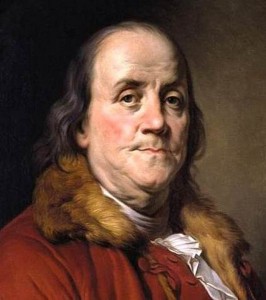
Today we continue our series examining our Founding Fathers in their own words and considering their high esteem for religion, religious liberty, and virtue.
Below is a transcript of Benjamin Franklin’s motion requesting a chaplain be appointed to offer daily prayers before discussing adoption of a federal constitution — dated June 28, 1781.
Mr. President, the small progress we have made after four or five weeks’ close attendance and continual reasonings with each other–our different sentiments on almost every question, several of the last producing as many noes as ayes–is, methinks, a melancholy proof of the imperfection of the human understanding. We indeed seem to feel our own want of political wisdom, since we have been running about in search of it. We have gone back to ancient history for models of government, and examined the different forms of those republics which, having been formed with the seeds of their own dissolution, now no longer exist. And we have viewed modern states all round Europe, but find none of their constitutions suitable to our circumstances.
In this situation of this assembly, groping, as it were, in the dark, to find political truth, and scarce able to distinguish it when presented to us, how has it happened, sir, that we have not hitherto once thought of humbly applying to the Father of lights to illuminate our understandings? In the beginning of the contest with Great Britain, when we were sensible of danger, we had daily prayer in this room for the divine protection. Our prayers, sir, were heard, and they were graciously answered. All of us who were engaged in the struggle must have observed frequent instances of a superintending Providence in our favor. To that kind Providence we owe this happy opportunity of consulting in peace on the means of establishing our future national felicity. And have we now forgotten that powerful Friend? Or do we imagine that we no longer need his assistance? I have lived, sir, a long time, and, the longer I live, the more convincing proofs I see of this truth–that God governs in the affairs of men. And if a sparrow cannot fall to the ground without his notice, is it probable that an empire can rise without his aid? We have been assured, sir, in the sacred writings, that “except the Lord build the house, they labor in vain that build it.” I firmly believe this; and I also believe that without his concurring aid we shall succeed, in this political building, no better than the builders of Babel. We shall be divided by our little partial local interests; our projects will be confounded; and we ourselves shall become a reproach and by-word down to future ages. And, what is worse, mankind may hereafter, from this unfortunate instance, despair of establishing governments by human wisdom, and leave it to chance, war, and conquest.
I therefore beg leave to move that, henceforth, prayers imploring the assistance of Heaven, and its blessings on our deliberations, be held in this assembly every morning before we proceed to business, and that one or more of the clergy of this city be requested to officiate in that service.

